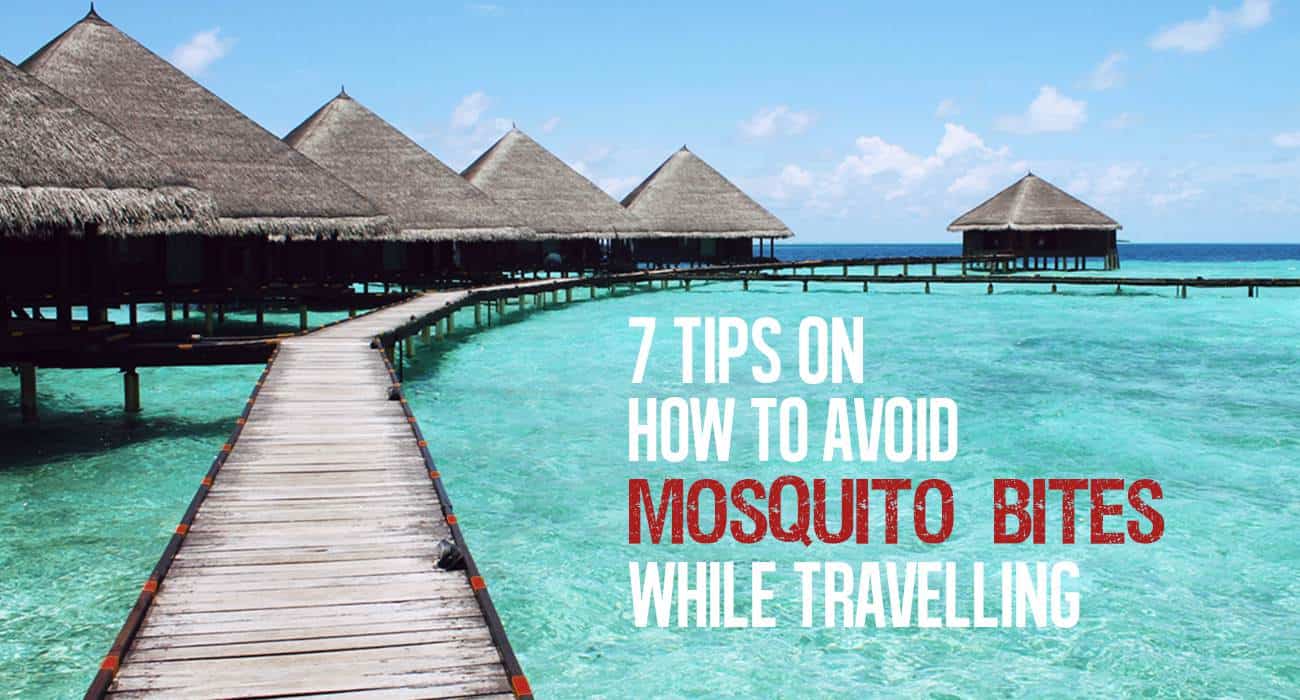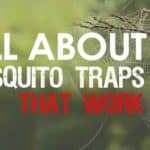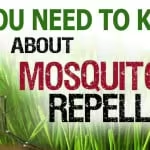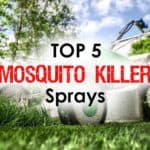This guide shows you some easy to follow steps to stay safe while you are on the road.
After having travelled many different countries full of harmful mosquitoes and other bugs I developed an effective strategy that keeps most of them at bay.
I will give you an overview about 7 important steps to prevent mosquito bites when you are camping, backpacking or if you’re just about to do some travelling in risky countries.
Tip 1: There is nothing like a 100% solution
Although there are some effective means against mosquitoes none of them guarantees full protection. From my experience it’s best to not rely on just one thing to prevent bug bites.
A combination of different strategies usually works best and minimizes your risk.
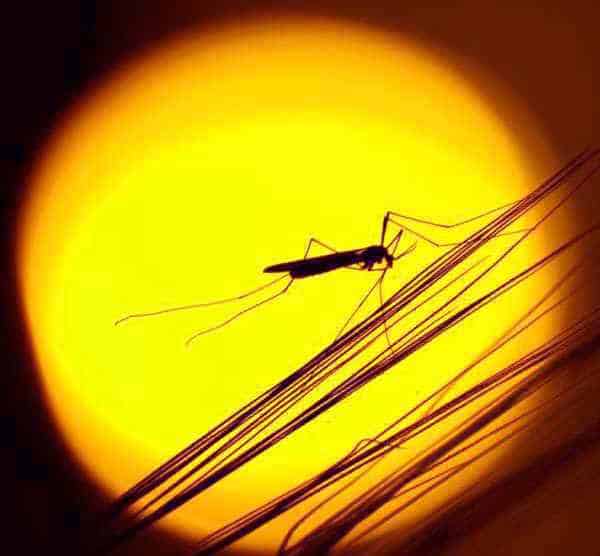
Try to familiarize yourself with the bugs of the area you are going to visit. What diseases are common and which animals carry them? Know your enemy and try to avoid them. Look for alternatives to very dangerous areas whenever it’s possible.
However I understand that this approach is not always feasible so here are the best tips to stay safe:
Tip 2: Use mosquito repellents
When you are out in the woods it’s almost impossible to avoid mosquitoes. No trap and no form of control can get rid of all of them. That’s where repellents come into play which save you from endless waves of mosquitoes.
Contrary to popular belief most of them don’t kill any bugs but repellents just protect you.
After you have applied them on your skin or clothes you become ‘invisible’ for their sensory system. The little bloodsuckers might still land on your arm but they won’t recognize you as a target.

- For up to 10 hours
- Perfect for hiking, camping and other outdoor activities
- Won’t sweat off
Last update on 2025-09-17 / Affiliate links / Images from Amazon Product Advertising API
Repellents have been proved to be one of the best choices against mosquito borne diseases in numerous scientific studies. I covered all the important facts about anti-mosquito sprays in my extensive guide.
The following graphic should give you a good overview about the stuff that works.
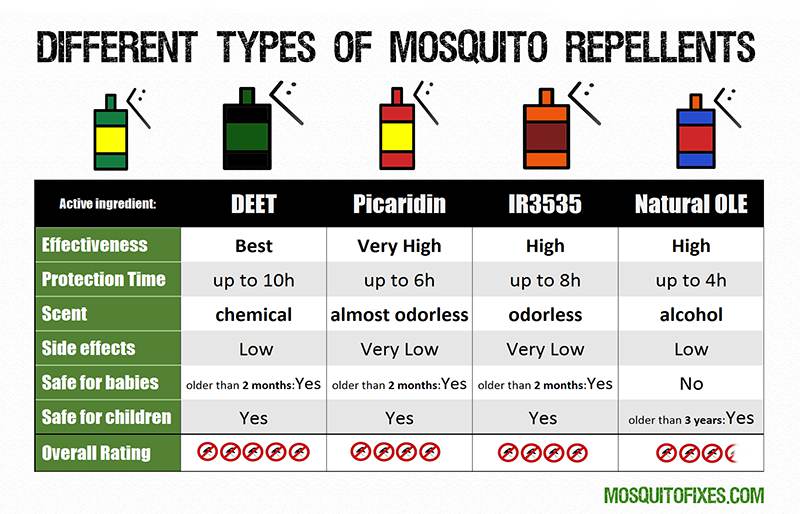
Synthetic repellents with DEET or Picaridin work very reliably and up to 10 hours. Pick one of the ingredients registered with the EPA and you generally will be fine as long as you apply it correctly.
The lower amounts around 20-30% work almost as effective as high-concentrated sprays.
If you’re just doing some sightseeing this is generally considered enough. The main difference to more powerful repellents is that the potent ones last longer than their weaker counterparts.
I generally use them when I’m hiking in the rain forest or for safaris in Africa. If there is an activity that causes me to sweat a lot I stick to high concentrated once because they proved to protect me more thoroughly.
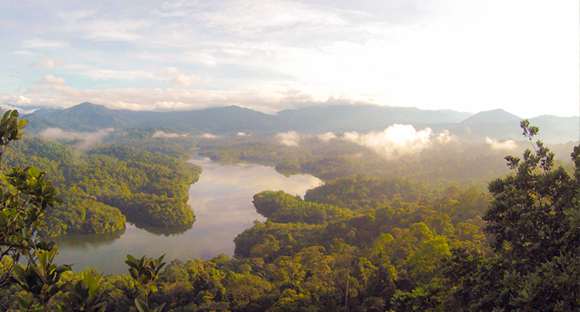
Natural repellents work too but can be less reliably and less durable. They are definitely worth a try if you are concerned about the safety of DEET. I sometimes use them when I’m in the States but for other countries I prefer synthetic ones.
Tip 3: Use clothing to repel bugs
The right outfit is a great way to reduce the need of repellents on your skin. Clothes are an additional layer that can make it difficult for mosquitoes to bite you.

- Effective defense against many biting insects
- Cool, comfortable and chemical free
- For hunting, fishing, hiking, or any outdoor activity
Last update on 2025-09-17 / Affiliate links / Images from Amazon Product Advertising API
If the fabric is thick enough they can’t penetrate your skin. In addition they also save you from the sun’s UV rays so try to cover as much exposed skin as possible. Therefore they are a great way to add another layer of protection that creates a barrier for mosquitoes.
However it can be tough to wear a hoodie in hot climates. Fortunately there is treated clothing available. Mosquito-proof outfits are pre-treated with Permethrin, a chemical that puts little bloodsuckers off. That way even very thin and functional clothing can help against dangerous bites.
I understand that chemicals on your clothes sound a bit unsettling but in contrast to mosquito borne diseases they are the better option. Certain colors might also attract certain types of mosquitoes but I haven’t found a clear pattern yet. It really depends on the area you visit and the bugs you encounter there.
Tip 4: Netting, Netting, Netting
One of the best ways to keep yourself sane is to use mosquito nets. They not only help to prevent bugs from entering your home but you can also use them on vacation. Traveling nets are a great way to stay safe while sleeping.

- For travelers and campers
- Fits over double bed, two cots, or sleeping bags
- For one or two persons
Last update on 2025-09-17 / Affiliate links / Images from Amazon Product Advertising API
I recommend that you bring your own netting because many meshes provided by guesthouses or hotels can have holes.

- Compact and lightweight
- Keeps out the majority of insects
- For a peaceful night without any bites
Last update on 2025-09-17 / Affiliate links / Images from Amazon Product Advertising API
I personally use a lightweight one that is easy to set up and keeps mosquitoes at bay. In case you are doing hard-core trips into the jungle you can consider a mosquito tent as well. Most of them not only come with a waterproof basement layer but also with protection against bugs like no-see-ums.
Tip 5: Eat like the locals
First of all I have to admit that there is no scientific evidence that certain foods can prevent mosquitoes from biting you. In all countries I visited every local gets harassed by bugs here and there.

While I would never rely on this tip alone I noticed that I attract way less mosquitoes once I have accustomed myself to the local cuisine (hint: it’s very delicious too!). I suspect that as a tourist your body odors stand out from the crowd and that’s why you are the preferred target for many flying insects.
Tip 6: Feel the breeze
A 100% chemical free solution is to stay in windy areas. Mosquitoes have a hard time to land on your skin if there is a slight breeze. If possible stay near electric fans or even in rooms with air-con.
Not only will they offer relief from hot temperatures but also annoying bugs.

While you won’t find one in the jungle they are very common in many tourist places like Southeast Asia or South America. In my opinion such spots are a great way to minimize the risk of getting bitten without any form of repellent.
Tip 7: Check your environment
It is generally a great tip to observe your environment. Avoid staying near stagnant waters or too much bushes as they are an excellent breeding ground for mosquitoes.
Sometimes it can help to just rest half a mile further away to not get noticed by any bugs.
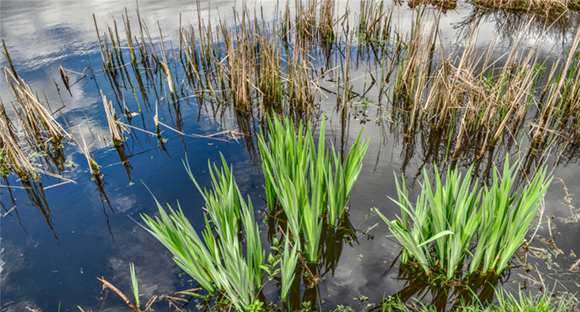
Another hint is to watch when the mosquitoes are coming for you. Often hordes of them attack during dawn while they mostly don’t bother harassing you during day time.
It can really help to observe what is going on around you and try to avoid environments that put yourself at risk.
Conclusion:
When it comes to mosquitoes you have to address the issue with a combination of strategies.
- Don’t rely on just one easy fix but choose a working repellent as well as additional layers of protection.
- It’s always good to have a fallback option in case something doesn’t work.
There are currently 176 mosquito species in the US alone so what might work against one type can be useless against another. That said I never had to suffer from Zika, malaria or yellow fever during my trips to other countries.
If you follow the strategies above you minimize the risk considerably.
Bonus: Rely on mosquito control
All of the tips of above work great against mosquitoes that are grown up and potentially harmful. However the best way to deal with them would be if they wouldn’t bother you at all. That’s where mosquito control comes into play.

There are certain strategies you can follow to diminish mosquito populations in greater areas. While you won’t be able to do that as a tourist you can prevent mosquitoes near your home:
- Clean up your garden and remove breeding grounds like standing waters, bird baths or useless hedges
- Use mosquito killers to prevent the larvae from hatching
- Work together with your neighbors and local authorities to fight the mosquito population effectively
Hi! My name is Mark and I’m an outdoor freak.
Visiting many exotic places around the world allowed me to gain some knowledge about effective mosquito control. That’s why I decided to start this site and give you in-depth reviews regarding the best repellents and traps.
And yes, you may call me Mosquito Mark.
